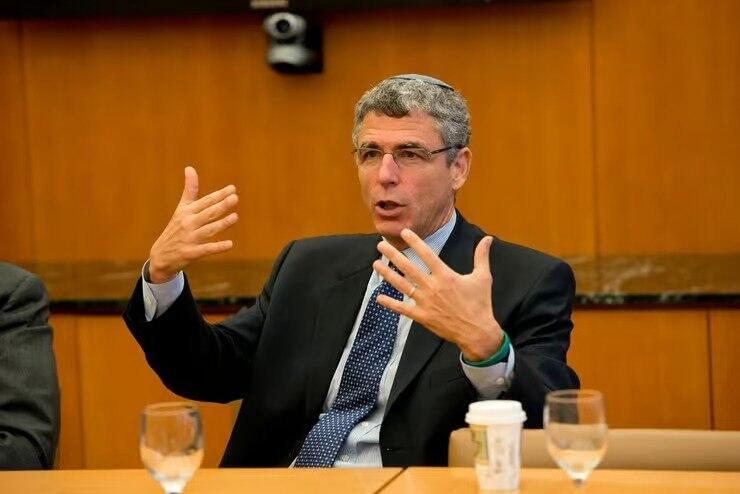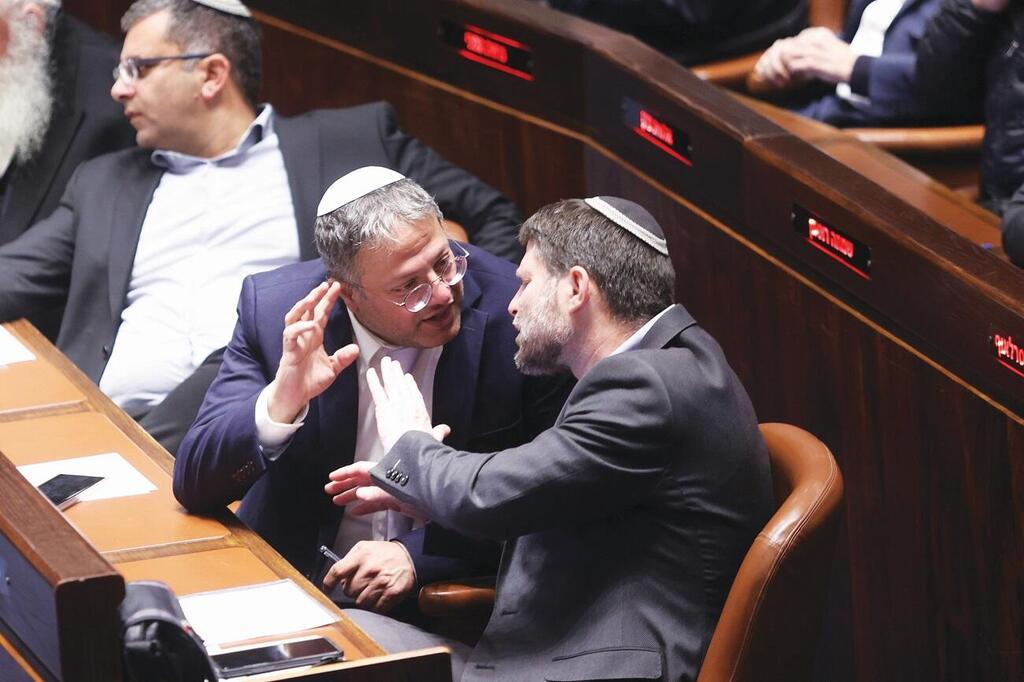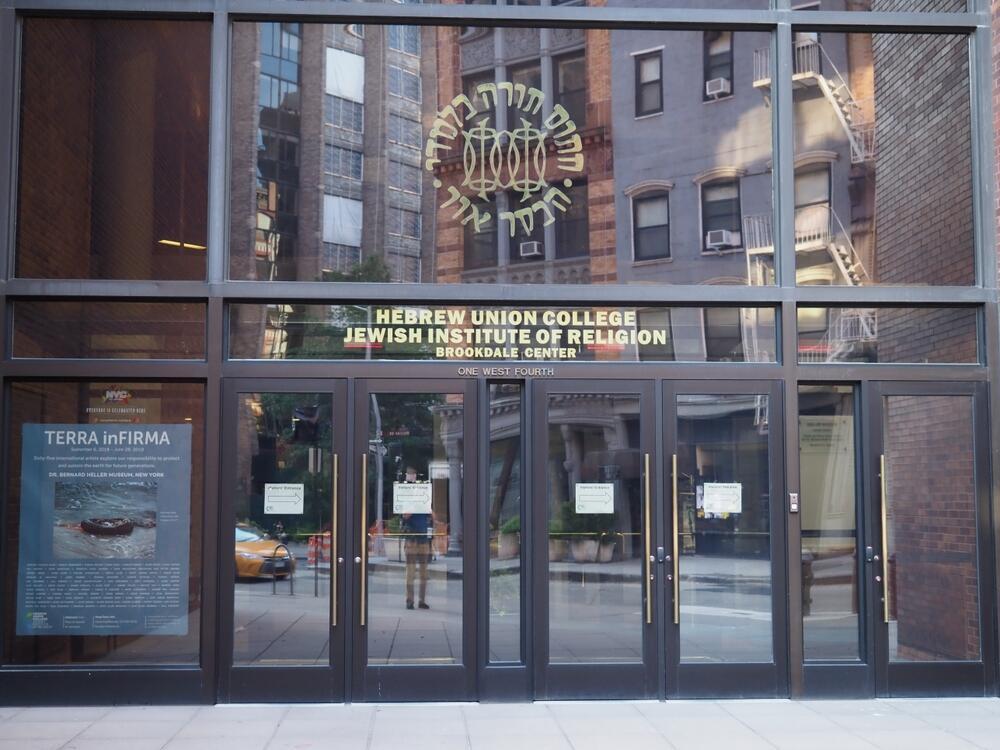Getting your Trinity Audio player ready...
Rabbi Rick Jacobs, the President of the Union for Reform Judaism in North America, recently visited Israel—his fifth visit here since the beginning of the war. Between one meeting and another, he found time for an interview with Ynet.
Regarding the rise in antisemitism in the United States, he says that he cannot remember such a difficult time. He stresses that antisemitism does not distinguish between Reform, Conservative and Orthodox Jews, and when a Jew from one stream is attacked – it affects everyone.
3 View gallery


Union for Reform Judaism in North America President Rabbi Rick Jacobs
(Photo: Noam Galai)
Now he hopes that we Israelis will learn from the Jews of North America how to live together and sit around one table—Reform, Conservative and Orthodox.
Rabbi Jacobs calls his current visit to Israel a solidarity tour. This time, he spent time with members of the Reform youth movements who came specially from the United States, despite the war in the south and the escalation in the north. His schedule also included meetings with leaders of the Reform Movement in Israel and with Knesset politicians in the Knesset. He to plans to return here again in October.
Rabbi Jacobs is concerned that extremists in the right-wing government will change the Law of Return and prevent Reform Jews from immigrating to Israel. He encourages the Israeli Ultra-Orthodox to enlist in the IDF and adopt the model of Orthodox Judaism in the U.S. He says he is less concerned about assimilation, and that since the Hamas terror attack on October 7, there has been an increase in requests for conversion among mixed couples.
According to him, the rise in antisemitism after October 7 harms all the streams of Judaism in the United States. "It’s clear that the rise in antisemitism is in all communities", he says. "I live in New York, where there is a large Jewish population. There are places where Reform Jews are a minority, and everyone's sense of vulnerability is real. The antisemitism we experience on the social media is terrible. There are examples of harassment and physical attacks. No one in the Jewish community is immune to antisemitism. We see great efforts to respond, including from the White House. There is a response from the administration. We meet ministers, heads of the FBI and the attorney general."
Ultra-Orthodox youths attacked in Williamsburg
Rabbi Jacobs says that the U.S. administration should do more. "This requires the administration to intervene and ensure that all residents are protected", he says. "It has reached not only the campuses, but also schools and kindergartens, and even synagogues. We all feel it and are working hard to solve it. I cannot remember such a difficult period in terms of antisemitism in North America. It has always been present, but now it is overt."
He says that one of the challenges is the connection between antisemitism and anti-Israel sentiment. "People are criticizing Israel. Criticizing the Israeli government is not anti-Semitic and not anti-Israel", he explains. "But we are hearing voices calling for the destruction of Israel and against its right to exist. Not just in favor of establishing a Palestinian state, but things that should concern many Jews. This is the type of antisemitism we hear, and it is connected to anti-Israel sentiment. For example, Jewish communities that have struggled in the past with oppression and fanaticism are now receiving hatred."
He says that there are those in North America who have actually chosen to emphasize their Judaism after the Hamas terror attack. "It's important to me that people in Israel understand that we still live free and proud lives in North America", says Rabbi Jacobs. "There are even people who because of the situation are now wearing kippot and dog tags of the hostages. Some people are now deliberately expressing public positions. They might say terrible things to us on the street, but we are not hiding in our homes, under the tables, and we are not afraid to live our lives. We are more aware. We see terrible hatred on social media. The social networks are multipliers of the hatred that has existed for thousands of years."
Rabbi Jacobs doesn't distinguish between antisemitism toward Reform or Orthodox Jews. "It's the same evil", he says. "I work closely with my Orthodox colleagues. Orthodox Jews cannot appear in public without being identified as Jews. Of course, this is because of their clothing. A liberal Jew can wear a baseball cap. It is expressed more toward Orthodox Jews. In New York, there have been many incidents—I always condemn antisemitic incidents against Orthodox Jews. It's important to understand that we are one people and when you attack one, you attack us all."
"We might pray differently, believe in different ways, and even vote differently - but when it comes to talking about Jewish security, there's a unified message. It would be wonderful if such Jewish solidarity existed in Israel."
According to him, antisemitism has brought the different streams of Judaism closer together. "We work closely with the Orthodox, in a way that surprises Israelis," he says. "Since the rise in antisemitism, there has been more coordination between us. But I want people to know that in America, we always sit together in meetings with senior officials. This doesn't mean we agree on everything related to Judaism, we might pray differently, believe in different ways, and even vote differently - but when it comes to talking about Jewish security, there's a unified message. This is very important, and we need to continue with it. It would be wonderful if such Jewish solidarity existed in Israel. I've never met with Orthodox leaders in Israel, and Orthodox leaders in Israel have never sat down for a conversation with me."
About the legislation in Israel that could harm Reform Jews, Rabbi Jacobs says: "Let's be honest. In my opinion, this government is not equitable toward the Reform Movement in budgetary and legal terms. Israel is the only country where Reform Rabbis cannot officiate weddings, and our institutions receive a tiny fraction of the budgets that the Orthodox receive. This has been going on for years, since the establishment of the state. But this government is the most extreme that Israel has ever had. This is a government without commitment to pluralism, and it has no commitment to enable authentic Jewish life."
He is pessimistic about changing the policy of the current government. "We would like to see a government that reflects the diversity of society and people—one that ensures keeping all of us safe here and ensures raising a generation that respects democracy and believes that there is civil commitment and commitment to serve the state", says Rabbi Jacobs. "There are many important issues. Some of the issues have been sidelined because of the war."
Rabbi Jacobs was asked about intermarriage marriages between Jews and non-Jews in North America. "The number of Jews who are married to non-Jews is very high", he admits. “Especially among Israelis living in North America, there are high rates of mixed marriages. But some of my colleagues grew up in homes where their fathers or mothers were not Jewish, and they studied at Jewish schools, went to Jewish summer camps, and studied Judaism. From an Israeli point of view, you think that if someone marries a non-Jew, you lose them. I argue that there are so many mixed families that are active in the Jewish community, active in supporting Israel and in Jewish life. We are focusing on efforts to bring in more people, including those in mixed marriages, and we are very successful."
He further says: "I think it's hard to see this from a distance, but I can give many examples of how the community has become stronger because of people who came to Judaism, and many of them during the war happening in Israel. Since October 7, there have been more conversions to Judaism than before. Jewish tradition is very attractive, especially among couples where one of the partners is not Jewish. They choose to be part of the community, and in many cases, choose to convert."
Regarding the changes the Reform Movement in North America has undergone recently, he shares: "One of the most important changes is working with synagogues to raise awareness not only among members of the community but also among those outside it, and to connect them to Jewish life. There are more people who want to learn about Judaism since October 7. We conducted surveys, and it turns out that people want to understand more about what it means to be Jewish, and want to get to know Jewish traditions. We have decided to be involved with people who were not involved. We told the synagogues—go to them, make contact, and bring them in. The fruits of this work were very positive."
He was asked about criticism of Israel among the Jewish community, especially among far-left people, such as the Jewish Voice for Peace (JVP) organization. "I want you to know that JVP is a very small movement in the North American Jewish community", says Rabbi Jacobs. "We are the largest Zionist movement in North America, and we are very vocal and proud of our Zionism."
"We are active and we bring many of our adults and youth to Israel," according to him. "We bring Israeli contents to our activities. We respect people who have different opinions, but we disagree with those who demonize Israel. You can criticize Israel; most Israelis I know criticize Israel—but it comes from a place of love and commitment."
The Reform Movement operates summer camps in North America. Rabbi Jacobs says that this year, many young Israelis who have served in the reserves and fought in Gaza and the north of Israel are participating in the summer camps. "They bring authentic Israeliness, the voices of Israelis. There are also children from the area close to Gaza. Some are from the north. We ensure that Israel is a topic you can talk about and learn from each other about. We teach how to discuss the difficult issues and how to respond when confronting it—this is very helpful to our staff."
3 View gallery


'This government is the most extreme that Israel has ever had'
(Photo: Alex Kolomoisky)
In addition to the rise in conversions, it appears that there is also an increase in the number of people interested in immigrating to Israel among Reform Movement members. "There is a consistent increase in Aliyah", he declares. "I don't know if you see this at the moment. Some of the people feel that they want to immigrate now because they want to demonstrate more than solidarity, to be here in Israel and to be part of society—and to defend Israel and make it more flourishing. We are also aware of the threat of war in the north of Israel. There is a lot of solidarity. To come and live here or to come for a Sabbatical—some people are also asking if it's the right time to come."
But not everyone will welcome immigrants from the Reform Movement. "I think there are many ministers who don't want it, but I don't think this will have an impact", says Rabbi Jacobs. "Those who want to change the Law of Return don't want to allow people who are Jewish by choice and have been converted by a Reform or Conservative Rabbi to immigrate. If tomorrow the government changed the law, they would prevent them from immigrating under the Law of Return. I think there are people who think we are more liberal regarding Judaism and politics. We are the largest community in the U.S.—and we are committed to Judaism. If they are not happy for us to come, that is their problem, not ours."
When asked if he would also be meeting Ben Gvir and Smotrich. "I am not meeting Smotrich or Ben Gvir and most of the leaders of the American Jews do not meet them because of their very extreme opinions", says Rabbi Jacobs. "I have met many other ministers in this government."







